| Srl | Item |
| 1 |
ID:
112739
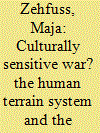

|
|
|
|
|
| Publication |
2012.
|
| Summary/Abstract |
Since around 2005, efforts have been made within the US military to highlight the significance of culture or the 'human terrain' for counterinsurgency operations. The US Army responded to the asserted 'cultural knowledge gap' by establishing an experimental programme called the Human Terrain System (HTS), which involves deploying social scientists alongside combat forces. While HTS was received favourably in the US mainstream media, it has been fiercely criticized by anthropologists in particular, who argue not least that participation in the programme would constitute a violation of their professional ethics, which require them to protect their research subjects. This article explores the anthropologists' critique and its limitations, arguing that it fails to tackle the problem of ethics deployed as a supposedly extra-political standard that can serve to (de)legitimize political projects. In particular, it is unable to dislodge the fantasy of protection at the heart of the argument for HTS.
|
|
|
|
|
|
|
|
|
|
|
|
|
|
|
|
| 2 |
ID:
064522
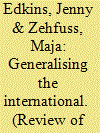

|
|
|
| 3 |
ID:
168865
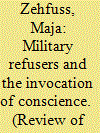

|
|
|
|
|
| Summary/Abstract |
During the Iraq War, some US soldiers refused (re)deployment. While liberal states appear to protect individuals’ right not to fight against their moral convictions by allowing the right to conscientious objection, those whose objections do not align with the regulations have to break the law in order to follow their convictions. This article explores how the legitimation of liberal war is challenged when we listen to the stories such refusers tell. Focusing on the United States, it briefly sets out the normative context such soldiers faced, highlighting the distinction between permissible conscientious objectors and contemptible deserters. Drawing on Judith Butler, it then focuses on two refusers by reading their own accounts of themselves in their memoirs. Despite not being eligible under the regulations, both invoke their conscience to make their refusal intelligible. By listening to their detailed accounts, the article traces the production and disruption of their subjectivities in relation to the prevailing moral order. Although invoking conscience appears to provide the chance to embrace an authentic self in a bid to resist the problematic moral order, subjectivity remains fractured due to relationality. Put differently, the sovereign subjectivity required by liberal war is simultaneously undermined by it.
|
|
|
|
|
|
|
|
|
|
|
|
|
|
|
|
| 4 |
ID:
079469
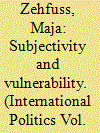

|
|
|
|
|
| Publication |
2007.
|
| Summary/Abstract |
When US President George W Bush and UK Prime Minister Tony Blair argued in favour of war with Iraq, they offered a variety of reasons ranging from the now infamous claim that the country possessed weapons of mass destruction to the need to effect regime change. Such arguments were roundly criticized by opponents of the war, because the claims were, even if true, not regarded as legitimate reasons for war or because the factuality of the claims was rejected in the first place. In contrast to such lines of critique this article does not consider whether these claims could be considered accurate or sufficient. Rather, it uses Judith Butler's critique of ethical violence to elucidate the political implications of speaking and acting ethically. In particular, it explores the problematic of subjectivity and vulnerability and suggests that arguments for the war cannot effectively be contested logically; rather we must highlight the way in which they produce what they claim to name
|
|
|
|
|
|
|
|
|
|
|
|
|
|
|
|
| 5 |
ID:
107612
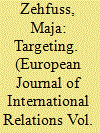

|
|
|
|
|
| Publication |
2011.
|
| Summary/Abstract |
War necessarily involves destruction. The development of precision-guided munitions seems to have made it possible to produce intended damage with increasing efficiency and to reduce 'collateral' damage. This has given rise to the expectation that fighting with such weapons reduces the extent of destruction and, crucially, that it is therefore becoming increasingly possible to protect non-combatants during war. This article examines this idea by exploring in some detail what is meant by 'precision' and asking how far this actually entails protection for non-combatants. The article shows how praise for precision not only produces Western warfare as ethical but also both relies upon and reproduces a particular kind of ethics, based on the notion of non-combatant protection. The conclusion draws together the implications of the faith in precision for how we think about war and challenges the underlying assumption that more precision is better.
|
|
|
|
|
|
|
|
|
|
|
|
|
|
|
|